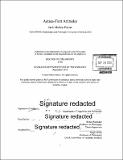Action-first attitudes
Author(s)
Marley-Payne, Jack
DownloadFull printable version (10.61Mb)
Other Contributors
Massachusetts Institute of Technology. Department of Linguistics and Philosophy.
Advisor
Robert Stalnaker.
Terms of use
Metadata
Show full item recordAbstract
In this thesis, I present an action-first theory of knowledge and belief. We have a mutual interest in the successful action of our peers, and the significance of belief and knowledge stems from their role in promoting this success. Knowledge states tend to guide successful action, in an appropriately systematic manner. Belief states systematically guide our attempts to achieve our goals, and would lead to success if all went well. In defending the action-first account, I draw on a kind of pragmatism: we should look to the practical role of belief and knowledge attribution, in a social setting, to determine the nature of belief and knowledge themselves. The action-account states that the role of knowledge attribution is to identify and promote successful agents. This implies that knowledge itself is a state that tends to guide successful action. Similarly, the role of belief attribution is to help us predict how people will attempt to achieve their goals, and correct them to avoid failure where necessary. This implies that beliefs are action-guiding states that may not be success conducive - these are states that are apt to become knowledge given the appropriate evidence or argument. A final point is that the role of our ascriptions of rationality (and irrationality) is to promote practices that tend to lead to knowledge. This gives us a unified account of our concepts of knowledge, belief and rationality, founded in a cooperative society's interest in mutual success. Granting the action-account leads to significant consequences in epistemology and philosophy of mind. It gives us reason to reject various accessibility principles, and accept intellectualism with regard to know-how. All states that lead to successful action in a systematic manner, even if we do not consciously endorse their content, fit with the rationale of the action-account. Further, the account suggests a new way to model conflicted mental states, and suggests rethinking the role of the Bayesian ideal in our conception of rationality. These consequences, in turn, provide motivation for the action-account itself on pragmatic grounds: it opens up promising new lines of inquiry in philosophy.
Description
Thesis: Ph. D., Massachusetts Institute of Technology, Department of Linguistics and Philosophy, 2016. Page 166 blank. Cataloged from PDF version of thesis. Includes bibliographical references (pages 157-165).
Date issued
2016Department
Massachusetts Institute of Technology. Department of Linguistics and PhilosophyPublisher
Massachusetts Institute of Technology
Keywords
Linguistics and Philosophy.